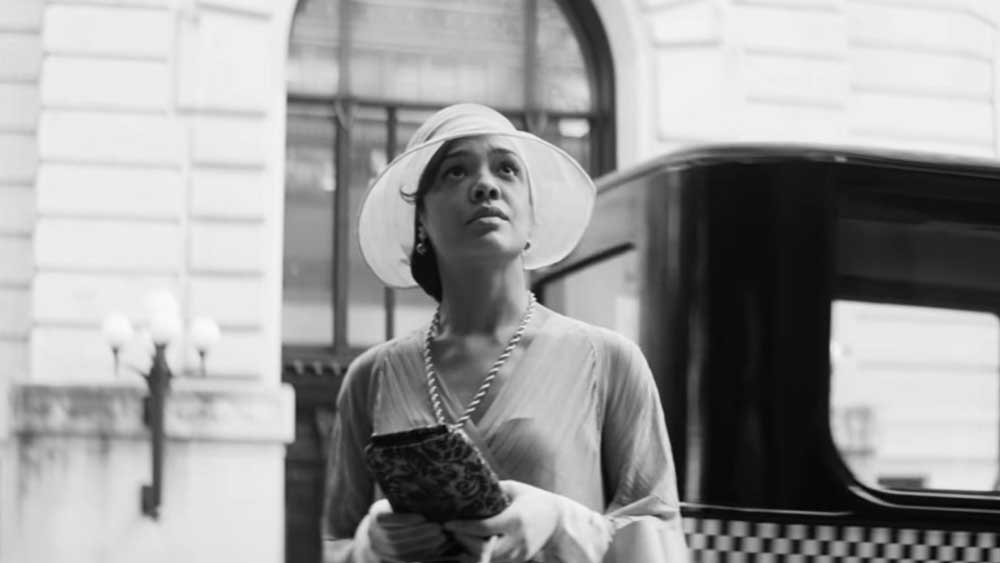Movie review: ‘Passing’
Published 3:30 pm Wednesday, November 24, 2021

- Tessa Thompson in a scene from “Passing” (2021).
A subtle character study mixed with an ever-powerful commentary on race in America, “Passing” is stirring. Written and directed by Rebecca Hall, her debut in both roles, the film is based on a 1929 novel of the same name by Nella Larsen and is set in that time. It opens during a heat wave with Irene (Tessa Thompson) dressed up and visiting a toy store to buy her son a birthday present.
She walks and talks carefully to every person she encounters, her cloche hat drawn far down over her eyes to shield them as best she can from anyone seeing her too carefully. Irene is Black, but with a lighter-toned skin color she is able to pass for white — hence the term, “passing.”
Struck by the heat, she grabs a cab, whose driver recommends she try visiting the Drayton Hotel for tea to cool off. She agrees, and when she arrives at said hotel, she again carefully walks in, hiding herself as best she’s able.
In the tea room, she encounters old childhood friend Claire (Ruth Negga), also passing for white. The two decide to go up to Claire’s room to chat free of prying ears and eyes, and we find out that Claire has been living happily passing for years — even her husband, John (Alexander Skarsgard), believes her to be fully white. In fact, John, who interrupts their tea and chat time, unabashedly admits that he hates Black people, even though he’s never met one, and calls his wife racial slurs because, according to him, her skin has been darkening over the years.
Disturbed by John’s bigotry and by Claire’s apparent tolerance of it, Irene leaves and hopes to avoid further connection with her friend. However, sometime later, Claire writes to tell her she’s moved back to New York and wants to rekindle their friendship.
Irene relents when Claire invites herself to a dance that Irene has organized for the Negro Collation she volunteers with.
As their friendship deepens, so too does their jealousy of each other. Irene is jealous of Claire’s beauty, charisma and ability to live without the fear of what being Black means. For Claire, she’s jealous of Irene’s life as a whole, living honestly and not hiding who she is.
Hall’s work here is masterful for a first-time writer/director, but her experience as an actor certainly lends a hand, particularly in the direction of Thompson and Negga.
Both are given the space to fully feel out their scenes and characters and discover the emotional impact behind each moment. While the cadence of dialogue between Irene and Claire feels like something you’d hear in a Howard Hawkes or Vincent Minelli film of the 1930s, the script never gives too much away. Instead, the audience relies on those unspoken instances of the performances of the two leads to really grasp what’s going on. Oozing with all kinds of tension, both women perform their roles beautifully, but it’s Negga who really captivates with the equally captivating Claire.
The film is also wonderfully edited by Sabine Hoffman, which effortlessly moves across the months-long friendship of these women, and Irene’s growing suspicions and nervousness regarding the state of her world and the world at large.
The use of black and white instead of color is a great choice too, albeit maybe an obvious one. Still, Hall and cinematographer Eduard Grau use it well to craft the story about how life is anything but black and white.
It is an incredibly timely story, one that, because it comes from a story written in 1929, is also unfortunately timeless. While the focus of the film is on the relationship between Irene and Claire, there is a broader story about the fear that Black families and individuals have by just existing. Strong parallels are made in the film between the world of 1929 Harlem and today, stark and necessary to recognize.
“Passing”
98 minutes
Rated PG-13 for thematic material, some racial slurs and smoking
3.5 stars








